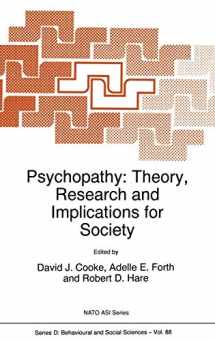
Psychopathy: Theory, Research and Implications for Society (NATO Science Series D:, 88)
Book details
Summary
Description
Psychopathy is a very important concept for those working in the field of criminal justice - investigators, prosecutors, and those who have to evaluate, manage and treat offenders. In Psychopathy: Theory, Research and Implications for Society, detailed, empirically based contributions by the world's leading researchers describe the relevance of the construct to practical and policy issues, examining its relevance to such topics as treatment, risk management and recidivism. The use of the concept in a range of populations is discussed, including juveniles, children, and the mentally disordered, as well as across cultures. The major strength of the volume is that the validity of the psychopathy construct is enhanced by the extensive empirical support: contributors explore topics including the genetic, biological, affective, interpersonal and information processing models that underpin the disorder.
Audience: All those dealing with offenders - psychologists, psychiatrists, lawyers, judges, prison administrators and those who formulate policy in the criminal justice system.


We would LOVE it if you could help us and other readers by reviewing the book
Book review



